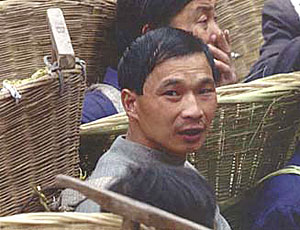|

FORTUNE SEEKERS: The massive urban-rural disparity in wealth has compelled a large number of farmers to seek jobs in cities
Getting the balance right between rural and urban areas in the quest to achieve a harmonious society is something causing the Chinese Government sleepless nights. In line with a resolution of the Standing Committee of the 10th National People's Congress, China's supreme legislative body, the country scrapped its agricultural tax from January 1, 2006.
In the middle of March 2004, Chinese Premier Wen Jiabao made a promise in his government work report to the annual session of the National People's Congress that "agricultural tax is to be phased out within five years." At the end of March 2004, the Chinese Government decided to repeal the agricultural tax in Jilin and Heilongjiang provinces on a trial basis and to reduce the tax rate in the country's 11 major grain-producing bases. By early 2005, 28 of China's 31 provinces, municipalities and autonomous regions had announced the exemption of agricultural tax. As a result, the Chinese Government has fulfilled its commitment to tax abolishment two years ahead of schedule.
"Issues related to agriculture, rural areas and farmers are the bottleneck in China's economic and social development," said Jin Renqing, Minister of Finance. "But the significance of agricultural tax exemption lies not only in the fact that it will help to promote farmers' living standards and agricultural development, but also in its contribution to the country's overall stability and the nation's revitalization."
Widening gap
Agriculture is a vital part of China's economy and thus the agricultural tax is the government's major financial source. Under the feudal system that was in place for 2,600 gears, the concept of "boosting agriculture and restraining commerce" was greatly encouraged by rulers of all dynasties, as at that time, almost all revenues was dependent on agriculture-related taxes.
After the People's Republic of China was founded in 1949, China was keen to develop its industry. As a result, it was decided that the agricultural sector must support the industrial sector unconditionally. The agricultural tax remained a major financial revenue contributor. Statistics show that during the early years of the People's Republic's founding, 39 percent of state revenues came from agricultural tax. During the 52 years from 1949 to 2000, Chinese farmers handed over 700 billion kg of grain to the state.
This situation gradually led to a large gap between rural and urban areas. At the initial stage of industrialization, centralized resource distribution, under the planned economy, was carried out to save on costs of industrial development. For example, since 1953, the Chinese Government had monopolized the purchase and marketing of grain and cotton. Through this system, farm produce was purchased at low prices and then supplied to industry as raw materials. But at the same time, farmers have to buy chemical fertilizers and other industrial products at high prices. This, together with losses resulting from low prices of farming products, is a double whammy. It is reported that during the monopoly years from 1953 to 1985, Chinese farmers made a contribution equal to between 600 billion-800 billion yuan ($75 billion-$100 billion) to the country's industrial sector.
|
